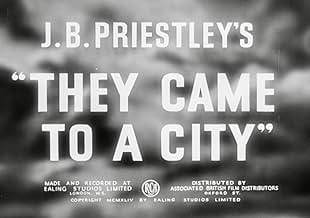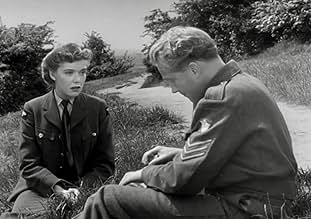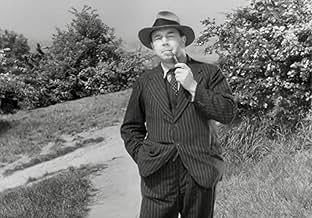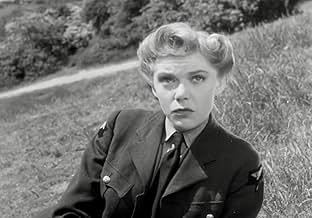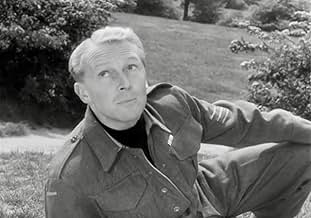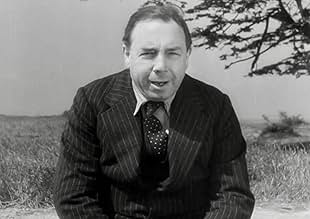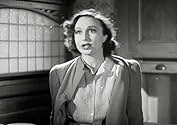Ajouter une intrigue dans votre langueAdapted from a J.B. Priestley play with many of the original actors. The tale of various people who have come to live in an "ideal" city and their hopes and reasons for doing so.Adapted from a J.B. Priestley play with many of the original actors. The tale of various people who have come to live in an "ideal" city and their hopes and reasons for doing so.Adapted from a J.B. Priestley play with many of the original actors. The tale of various people who have come to live in an "ideal" city and their hopes and reasons for doing so.
- Réalisation
- Scénario
- Casting principal
Mabel Terry-Lewis
- Lady Loxfield
- (as Mabel Terry Lewis)
Fanny Rowe
- Philippa Loxfield
- (as Frances Rowe)
Brenda Bruce
- WAAF
- (non crédité)
Ralph Michael
- Sergeant Jimmy
- (non crédité)
J.B. Priestley
- J.B. Priestley
- (non crédité)
Johnnie Schofield
- Bert the Barman
- (non crédité)
Avis à la une
Lovely piece about assorted people who discovered a happy land far far away - and some found it happier than others. But as noted elsewhere, the Utopia is portrayed without any explanation of how we got there. As another reviewer says, it captured the mood of the times. That mood produced the Attlee government - and after six years of it, it took another 13 before Labour got in again - and Harold Wilson had the sense not to promise Utopia. Unfortunately, The comparison with Lost Horizon is very apt, but Shangri-La doesn't work without it's supernatural elements - which unfortunately we don't possess.,
Nine disagreeable Britons representing different social/economic classes are mysteriously transported to a place with a door. As they wait for the door to open, we get to know them better. Eventually the door opens, and they go explore a city which the audience never sees. T The idea is that post WW2, England should become a more fair and equitable society with people who treat each other well. When the characters find themselves in such a city they have different reactions. It's interesting how some of the selfish ones try to emotionally drag those who want to live in the city back to their miserable lives. There is an episode involving a mother and daughter that is very similar to an episode in C. S. Lewis' novel "The Great Divorce" written 12 years later. It made me wonder if Mr. Lewis ever saw the film. Note: "They Came To A City" is similar to watching a stage play. At only 66 minutes long it's worth a look.
Based on J. B. Priestley's play, 9 characters from wildly different social backgrounds disappear into the dark one night and arrive at a vast structure which has an entrance to a new, never seen, city. Each of the 9 enter and then decide whether this apparent Utopia is for them or not.
Strange, wordy piece making little attempt to hide its stage origins. This was intended to look at Britain towards the end of the war and how as a society it was to land in its feet. Regrettably, Priestly, who appears briefly, clearly has decided which characters and classes are the good guys and which are the bad. So whilst there are certainly some interesting characters and ideas here, this rather didactic lecture makes it clear that the hard working, poorer and the left wing seeking the searches for Utopia are all right and the right wing are all upper class idiots frightened of change and only interested in money. It's all far too black and white with too many cliched characters and political speeches, particularly by free thinking revolutionary Dinmore played by John Clements who cries for change eloquently whilst the upper classes mumble and moan. It's a pity, because it's a fun idea and with a gentler touch and perhaps more ambiguity it could have been more interesting than it is. An intriguing but not wholly successful cinema oddity.
Strange, wordy piece making little attempt to hide its stage origins. This was intended to look at Britain towards the end of the war and how as a society it was to land in its feet. Regrettably, Priestly, who appears briefly, clearly has decided which characters and classes are the good guys and which are the bad. So whilst there are certainly some interesting characters and ideas here, this rather didactic lecture makes it clear that the hard working, poorer and the left wing seeking the searches for Utopia are all right and the right wing are all upper class idiots frightened of change and only interested in money. It's all far too black and white with too many cliched characters and political speeches, particularly by free thinking revolutionary Dinmore played by John Clements who cries for change eloquently whilst the upper classes mumble and moan. It's a pity, because it's a fun idea and with a gentler touch and perhaps more ambiguity it could have been more interesting than it is. An intriguing but not wholly successful cinema oddity.
Not exactly highly entertaining but it's not supposed to be entertaining as it's a comparison of posh rich people to poor ones.
Unsurprisingly the rich posh ones are not keen on a society where all are equal so the privileged positions that they currently enjoy would be lost. Eighty years later and nothing has changed as the rich continue to get richer and the poor get poorer.
My favourite character was the washerwoman who held the film together with her comments.
The set must have been very cheap to construct as it seemed to have been made of plywood painter to resemble stone.
Worth a watch but don't expect any excitement like a car chase for example.
Unsurprisingly the rich posh ones are not keen on a society where all are equal so the privileged positions that they currently enjoy would be lost. Eighty years later and nothing has changed as the rich continue to get richer and the poor get poorer.
My favourite character was the washerwoman who held the film together with her comments.
The set must have been very cheap to construct as it seemed to have been made of plywood painter to resemble stone.
Worth a watch but don't expect any excitement like a car chase for example.
A British drama; A story about how people might live if they were presented with the opportunity to live in a utopia, an "ideal" city, exploring their hopes and reasons for doing so. This is an eloquent, stagy allegory based on a play of the same title by J. B. Priestley. The direction, acting, and photography are all good, apart from occasional fits of overcooked melodrama within its bounds. It is an intelligent screenplay, but the tale within it lacks cinematic dimension with long, static sequences of dialogue; the audience is robbed of the pictorial element of what is hinted at about the mysterious settlement. Tied to this is a quite heavy political slant in the script, which is left for the viewer to accept as a task rather than for them to explore by diversion; the audience is locked out. Though the theme of universal friendship is explored well.
Le saviez-vous
- AnecdotesFinal film of Mabel Terry-Lewis.
- Citations
Alice Foster: I never thought there *could* be a place as good as this.
- ConnexionsFeatured in Sosialismi (2014)
- Bandes originalesMusic selected from The Divine Poem
Music by Aleksandr Skryabin (as Scriabin)
Played by The London Philharmonic Orchestra
Conducted by Ernest Irving
Meilleurs choix
Connectez-vous pour évaluer et suivre la liste de favoris afin de recevoir des recommandations personnalisées
Détails
- Durée
- 1h 18min(78 min)
- Couleur
- Rapport de forme
- 1.37 : 1
Contribuer à cette page
Suggérer une modification ou ajouter du contenu manquant

